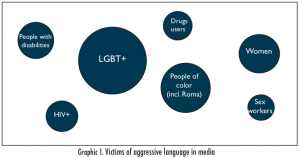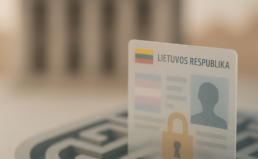In the framework of the Project “Promotion of Democracy – independent information dissemination from the Human Rights perspective“ LGL together with activists from partner countries Belarus and Ukraine, conducted a desk research on the topics of aggressive information in Lithuanian, Belarusian and Ukranian media, the legal framework of each Country and the relation between Human Rights activists and media. The research also focuses on the role of the media in eradicating and reinforcing discriminatory perceptions and the forms of aggressive speech that we face today.
Internet and social media: These platforms have a fundamental role in communication in nowadays, so it is very important to analyse relation between violence in the media and the increase of aggressive information. Aggressive content in online media and social networks includes behaviours like trolling, cyberbulling, insults, hate speech and online youth radicalization. Also, there are still major shortcomings in specific terminology and “thirst” for clicks, and the sensationalism of news in the new media has led to the aggressive information.
 Aggressive information is spread through aggressive language online usually by hate groups that support Nazism, racism, sexism or homophobia. Their messages are spread using social networks such as Facebook and Twitter, video platforms like Youtube, Online fundings websites to raise funds for their events and the Dark Web. Platforms like Facebook and Twitter have policies to protect users from hate speech.
Aggressive information is spread through aggressive language online usually by hate groups that support Nazism, racism, sexism or homophobia. Their messages are spread using social networks such as Facebook and Twitter, video platforms like Youtube, Online fundings websites to raise funds for their events and the Dark Web. Platforms like Facebook and Twitter have policies to protect users from hate speech.
Legal framework: In this context Lithuania, Belarus and Ukraine differ significantly with regards to level of press freedom: after the fall of the Soviet Union liberation of freedom of speech and freedom of expression took place but now the situation is different among the Countries. Belarus remains under the influence of the Russian regime and is considered one of the worst countries for freedom of speech and expression, there were notable improvements in in both judicial, political as well as societal spheres within Lithuania and Ukraine. The Russian-sponsored propaganda and the rise of the populist discourse pose a threat to the protection of journalists, freedom of speech and freedom of expression of minorities.
In 2010 Lithuania adopted a Law on the Protection of Minors against the Detrimental Effect of Public Information has been introduced, outlawing positive public portrayal of LGBTI issues and in 2017 the Parliament proposed a law to strengthen the notion of family based exclusively on a marriage between a man and a woman. In Belarus the government of Alyaksandr Lukashenka, who has held the presidency since 1994, dominates print and broadcast sectors and exercises control over private media through restrictive laws and regulations and Belarus remains one of the worst countries in the field of freedom of speech. Journalists are subjects to arbitrary detention and politically motivated prosecution. In Ukraine the human rights situation is difficult especially with the ongoing war and with the big influence of Russia foreign policies. The new government measures restricted media pluralism, freedom of expression and association. Attack on activists and journalists have been recorded.
Human Rights vs Aggressive Information

This publication has been produced under the framework of the project “Promotion of democracy – independent information dissemination from the Human Rights perspective”, funded by Lithuania’s Development Cooperation Programme.






